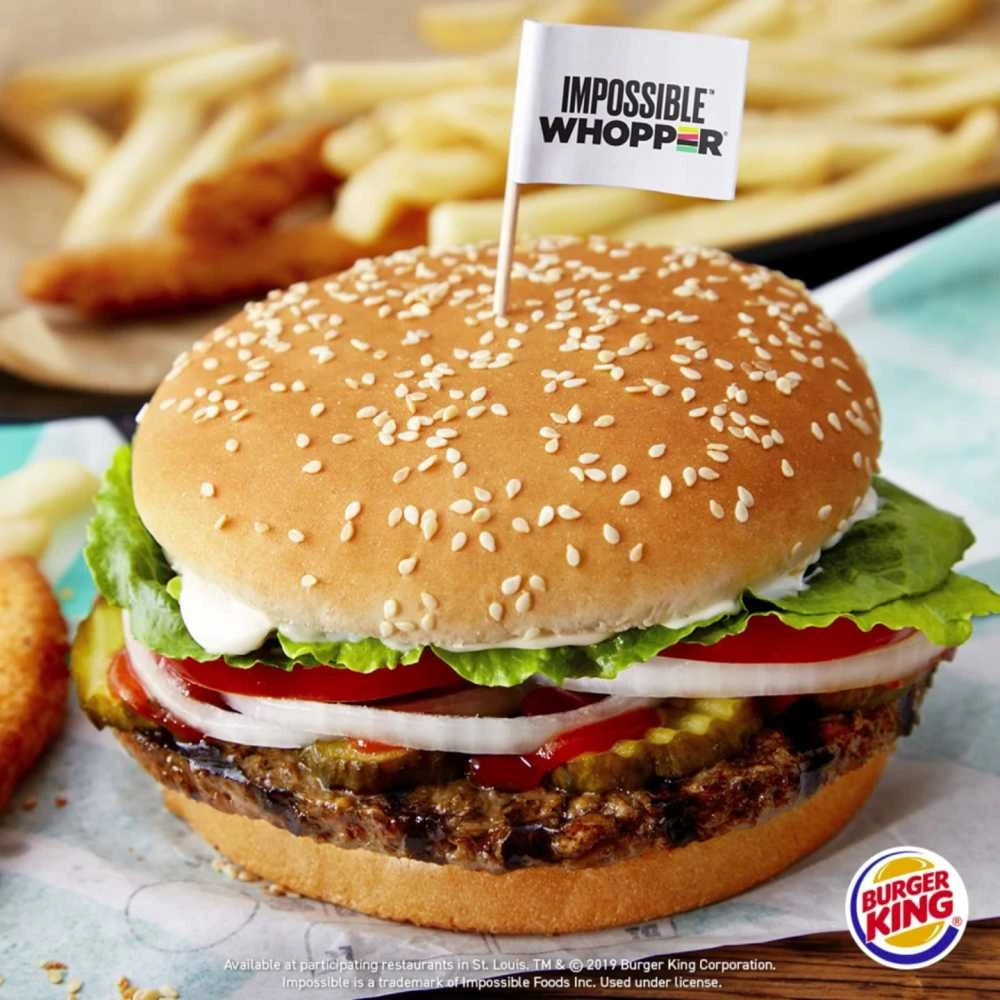Impossible Foods’ Environmental Impact—Increasing at Scale
(Impact Report 2019)
SCALING UP
Our mission of a vastly more sustainable food future, in which animals are not required for food, demands relentless growth and huge leaps in scale every year. And that means making the Impossible Burger available to mainstream, mass-market consumers around the world.
In 2016, the Impossible Burger made headlines with its debut at Momofuku Nishi in New York City – an award-winning bistro owned by meat-centric Chef David Chang. We quickly followed with launches with more of America’s hottest chefs – credible endorsement of an unprecedented plant-based meat. We expanded into America’s favorite “better burger” chains like Bareburger and Umami Burger, among others, across the United States.
In 2018, we entered the mainstream. America’s original fast food restaurant chain, White Castle, launched the Impossible™ Slider in 144 restaurants in April 2018. White Castle quickly expanded availability of the $1.99 Impossible Slider to all 377 restaurants nationwide.
The Impossible Burger is now available in more than 8,000 restaurants in every state in America – as well as Hong Kong, Singapore and Macau. During the second quarter of 2019, sales quadrupled in Asia alone – the key region(opens in a new tab) to bypass the environmental side effects of an increased demand for animal products. We are on track to continue our steep growth curve throughout 2019 and well beyond.
We started 2019 by launching our first significant product upgrade: Impossible Burger 2.0. The R&D team set ambitious goals for improving flavor, texture, appearance, versatility and protein quality, while lowering calories, total fat, saturated fat and sodium content, and further reducing environmental impact. The team nailed all of the goals.
Thanks to the product’s improved versatility, Impossible Burger works perfectly in any recipe that calls for ground beef, from any food culture – from dumplings and baos to lasagne, chili and Bolognese sauce. Chefs can cook it easily in a crock pot, flattop or any other equipment – including a flame-broiler or barbeque. As a result, restaurants increased the number of ways that the Impossible Burger is served, expanding it on the menu to tacos, dumplings, meatloaf, sloppy Joes and more.
Shortly after the launch of Impossible Burger 2.0, numerous additional restaurants added it to their menus, including America’s largest premium burger restaurant, Red Robin (570 outlets), and the fast casual Mexican food chain Qdoba (730 outlets). In March 2019, we launched the Impossible Burger in eight of the most respected restaurants in Singapore – further progress to help leapfrog the effects of expanding animal production’s footprint.

GREEN GOES MAINSTREAM
Plant-based meats have always been seen as a niche product for vegetarians. But in April 2019, Burger King launched the Impossible™ Whopper® in 59 restaurants in the St. Louis area. The fact that the world’s second largest burger chain would launch a plant-based version of its iconic Whopper generated headlines around the world. The move into Burger King signaled that a tectonic shift away from meat isn’t just possible, it’s inevitable – especially since Burger King announced its intention to serve the sandwich nationwide in all 7,200 of its US restaurants by the end of 2019.
The Impossible Whopper, as it will be known, is the biggest validation — and expansion opportunity — for a young industry that is looking to mimic and replace meat with plant-based alternatives.
– New York Times, April 1, 2019
By providing an uncompromisingly delicious plant-based option to its mainstream, meat-eating consumers at a huge scale, Burger King became one of the biggest corporate leaders in climate action and reducing the planetary impact of our food system, all while investing in growth and consumer loyalty.
Continuing the zeitgeist takeover of green eating, global influencers, including elite athletes and entertainers are increasingly using their far-reaching platforms to show the world through their own food choices that a healthy, sustainable, plant-based diet can be both fun and delicious, and to shine a spotlight on sustainable diets.
A plant based diet is healthier for me and the environment. I invested in Impossible Foods to provide plant based options for people that may not have ever had those choices due to cost and availability. I also don't have to sacrifice the taste and flavors I enjoy. My entire family can't get enough.
– Serena Williams
SYSTEM CHANGE FROM WITHIN
The way we achieve our environmental goals is to compete successfully in the market against animal-derived food products. As intended, more than 93% of our consumers eat meat at least once per month – increasing dramatically from 75% in 2016.
We’re determined to subvert the paradigm that business growth inherently comes at the expense of natural resources and natural ecosystems. Rather, the unique business model of Impossible Foods harnesses the power of consumer demand to spare resources. Climate and biodiversity goals are at the heart of our strategy, offering a radical way for established businesses like Burger King to take a decisive and meaningful step toward creating a better world for new generations of consumers.

BEEF IS JUST THE BEGINNING
About 10 billion pounds of ground beef is sold every year in the U.S. Currently, the Impossible Burger accounts for less than a tenth of a percent of that volume. And while we maintain our focus on our flagship product, we continue to strengthen our technology platform to offer consumers more sustainable alternatives to the full range of inefficient animal products, with a big focus on the environmental problem-child of agriculture: cattle. As such, steak and whole cuts of beef are in active development.
Our platform has never been burger-specific. We’re continuing to invent and discover the capabilities and tools for the whole range of meat and dairy products from plants. Plant-based fish is a particularly high priority, as marine harvesting has decimated underwater populations and is leading to a collapse of biodiversity in oceans, lakes, and rivers.
Our platform also allowed us to develop another iteration of plant-based beef. In early 2019, Little Caesars, one of the world’s biggest sellers of pizzas, asked if we had a plant-based equivalent of their popular sausage topping. Our scientists created more than 50 prototypes – and in May 2019, Little Caesars introduced the Impossible™ Supreme Pizza.
The entire industry needs to find ways to replace unsustainable animal systems, from the sea to the feedlots of the US. We’ve developed a technology platform to make rapid progress, but hope that this young plant-based meat industry can collaborate for shared progress in a way few others have – because the consequences of not doing so are unacceptable.
THE KIDS ARE ALRIGHT
This year, students mobilized. They rallied in the streets to demand climate action and marched out of schools. They gave fiery speeches at the United Nations and to national legislatures across the world.
Younger generations are more inclined to view climate change and biodiversity as priorities. They’ve inherited a mess, and they recognize that starving polar bears and razed rainforests mean an impoverished planet – and an existential threat for our own species. They’re fighting to wake the world from its collective passivity and indifference to the relentless march of climate change and biodiversity loss(opens in a new tab).
Adults keep saying: ‘We owe it to the young people to give them hope.’ But I don’t want your hope. I don’t want you to be hopeful. I want you to panic. I want you to feel the fear I feel every day. And then I want you to act. I want you to act as you would in a crisis. I want you to act as if our house is on fire. Because it is.
– Greta Thunberg, 2019
At Impossible Foods, our consumer researchers are picking up the same trends that we’re seeing on the streets of Paris, Singapore, Jakarta and Stockholm, where students are leading the charge toward a green planet.
Our own research shows that consumer attitudes toward animal-derived foods are quickly changing. Roughly half of Americans under 40 years old eat plant-based meat substitutes at least once a month, and two-thirds report eating more often than they did a year ago – and many are motivated by environmental concerns.
Younger consumers are less inclined to believe that eating meat from animals is part of the American identity, or that plant-based products won’t taste good. What parents feed their children influences future tastes, and younger parents are more likely to purchase plant-based meats than older parents.
We agree with these students: Let’s mobilize. Why sit back and wait for someone else to fix the big problems? If we have the know-how and the tools — and we do — it’s our responsibility to use them to save our beautiful planet. And if not now, when?